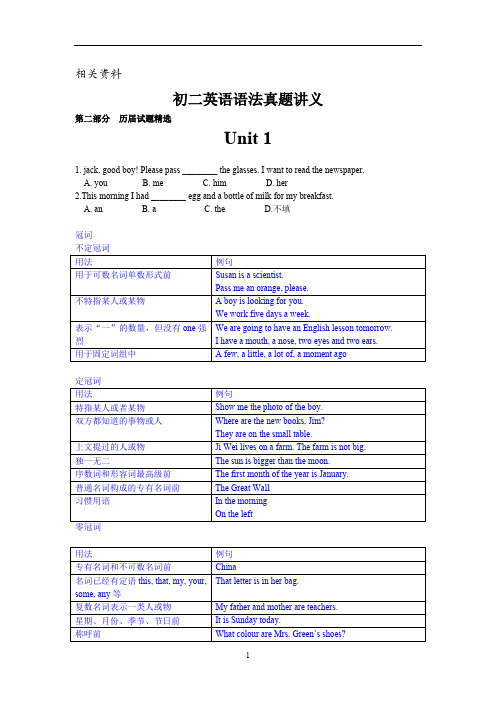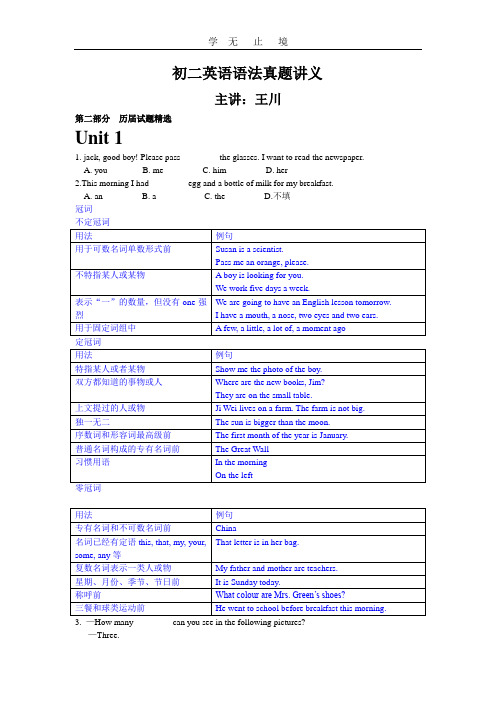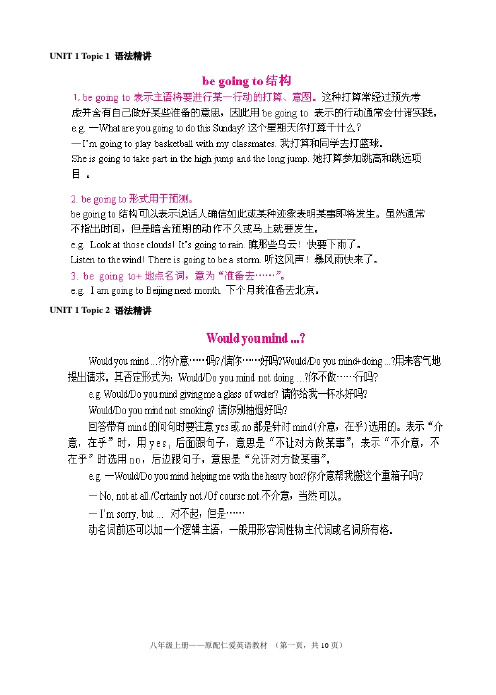【强烈推荐】英语语法全集 初二英语语法全真精讲讲义
- 格式:doc
- 大小:462.50 KB
- 文档页数:83

相关资料初二英语语法真题讲义第二部分历届试题精选Unit 11. jack, good boy! Please pass ________ the glasses. I want to read the newspaper.A. youB. meC. himD. her2.This morning I had ________ egg and a bottle of milk for my breakfast.A. anB. aC. theD.不填冠词不定冠词用法例句用于可数名词单数形式前Susan is a scientist.Pass me an orange, please.不特指某人或某物 A boy is looking for you.We work five days a week.表示“一”的数量,但没有one强烈We are going to have an English lesson tomorrow.I have a mouth, a nose, two eyes and two ears.用于固定词组中 A few, a little, a lot of, a moment ago定冠词用法例句特指某人或者某物Show me the photo of the boy.双方都知道的事物或人Where are the new books, Jim?They are on the small table.上文提过的人或物Ji Wei lives on a farm. The farm is not big.独一无二The sun is bigger than the moon.序数词和形容词最高级前The first month of the year is January.普通名词构成的专有名词前The Great Wall习惯用语In the morningOn the left零冠词用法例句专有名词和不可数名词前China名词已经有定语this, that, my, your,some, any等That letter is in her bag.复数名词表示一类人或物My father and mother are teachers.星期、月份、季节、节日前It is Sunday today.称呼前What colour are Mrs. Green’s shoes?三餐和球类运动前He went to school before breakfast this morning.3. —How many ________ can you see in the following pictures?—Three.A. boysB. animalsC. filmsD. buildings4. Timmy goes to school ________ every day. It's 5 minutes' walk from his home to school.A. in a busB. by planeC. on footD. by boat5. Everything is ________ at night markets. You don't need a lot of money to have a good time.A. cheapB. badC. tiredD. dear6. —Excuse me, ________ is the nearest bookshop?—Go down the street and turn left at the second corner.A. howB. whatC. whereD. who7. The sign tells us ________.A. NO SMOKINGB. NO PARKINGC. NO PHOTOSD. NO FOOD8. —Can you play football?—Yes, I can, ________ I can't play it very well.转折关系A. orB. andC. soD. but9. Last month, students had to have their lessons by internet ________ because of SARS.A. on the playgroundB. at homeC. in the streetD. near the hospital10. It is ________ today than yesterday. Shall we go swimming this afternoon?A .the hottest B. hotC. hottestD. hotter最高级要加the,由于hot为重读闭音节所以要双写t加est。

八年级英语语法精讲引言英语语法是英语学习的基础,掌握英语语法对于提高英语水平至关重要。
本文档将为您详细讲解八年级英语语法,帮助您更好地理解和运用英语语法知识。
第一章:时态1.1 一般现在时一般现在时用于描述经常性或习惯性的动作,以及普遍真理。
1.1.1 构成动词原形1.1.2 例句- I like apples.- She studies English every day.1.2 一般过去时一般过去时用于描述过去发生的动作或状态。
1.2.1 构成过去式1.2.2 例句- I visited my grandparents last weekend.- They watched a movie yesterday.1.3 一般将来时一般将来时用于描述将来会发生的动作或状态。
1.3.1 构成will + 动词原形或动词不定式1.3.2 例句- I will go to the store later.- She plans to study medicine.第二章:被动语态被动语态用于强调动作的承受者。
2.1 构成am/is/are + 过去分词2.2 例句- The book was written by him.- The window was broken.第三章:名词名词用于表示人、事物、地点等。
3.1 单数名词以辅音字母结尾的名词通常加-s或-es结尾。
3.1.1 例句- The cat is sleeping on the bed.- The cars are waiting at the stop sign.3.2 复数名词以元音字母结尾的名词通常加-s结尾。
3.2.1 例句- The children are playing in the park.- The women are talking in the kitchen.第四章:代词代词用于代替名词。
4.1 人称代词人称代词包括I、you、he、she、it、we、they。

初二英语语法真题讲义第二部分历届试题精选Unit 11. jack, good boy! Please pass ________ the glasses. I want to read the newspaper.A. youB. meC. himD. her2.This morning I had ________ egg and a bottle of milk for my breakfast.A. anB. aC. theD.不填冠词不定冠词定冠词上文提过的人或物Ji Wei lives on a farm. The farm is not big.独一无二The sun is bigger than the moon.序数词和形容词最高级前The first month of the year is January.普通名词构成的专有名词前The Great Wall习惯用语In the morningOn the left零冠词用法例句专有名词和不可数名词前China名词已经有定语this, that, my,your, some, any等That letter is in her bag.复数名词表示一类人或物My father and mother are teachers.星期、月份、季节、节日前It is Sunday today.称呼前What colour are Mrs. Green’s shoes?三餐和球类运动前He went to school before breakfast this morning.3. —How many ________ can you see in the following pictures?—Three.A. boysB. animalsC. filmsD. buildings4. Timmy goes to school ________ every day. It's 5 minutes' walk from his home to school.A. in a busB. by planeC. on footD. by boat5. Everything is ________ at night markets. You don't need a lot of money to havea good time.A. cheapB. badC. tiredD. dear6. —Excuse me, ________ is the nearest bookshop?—Go down the street and turn left at the second corner.A. howB. whatC. whereD. who7. The sign tells us ________.A. NO SMOKINGB. NO PARKINGC. NO PHOTOSD. NO FOOD8. —Can you play football?—Yes, I can, ________ I can't play it very well.转折关系A. orB. andC. soD. but9. Last month, students had to have their lessons by internet ________ because of SARS.A. on the playgroundB. at homeC. in the streetD. near the hospital10. It is ________ today than yesterday. Shall we go swimming this afternoon?A .the hottest B. hotC. hottestD. hotter最高级要加the,由于hot为重读闭音节所以要双写t加est。

初二英语语法真题讲义主讲:王川第二部分历届试题精选Unit 11. jack, good boy! Please pass ________ the glasses. I want to read the newspaper.A. youB. meC. himD. her2.This morning I had ________ egg and a bottle of milk for my breakfast.A. anB. aC. theD.不填冠词定冠词3. —How many ________ can you see in the following pictures?—Three.A. boysB. animalsC. filmsD. buildings4. Timmy goes to school ________ every day. It's 5 minutes' walk from his home to school.A. in a busB. by planeC. on footD. by boat5. Everything is ________ at night markets. You don't need a lot of money to have a good time.A. cheapB. badC. tiredD. dear6. —Excuse me, ________ is the nearest bookshop?—Go down the street and turn left at the second corner.A. howB. whatC. whereD. who7. The sign tells us ________.A. NO SMOKINGB. NO PARKINGC. NO PHOTOSD. NO FOOD8. —Can you play football?—Yes, I can, ________ I can't play it very well.转折关系A. orB. andC. soD. but9. Last month, students had to have their lessons by internet ________ because of SARS.A. on the playgroundB. at homeC. in the streetD. near the hospital10. It is ________ today than yesterday. Shall we go swimming this afternoon?A .the hottest B. hotC. hottestD. hotter最高级要加the,由于hot为重读闭音节所以要双写t加est。

UNIT 1 Topic 1 语法精讲UNIT 1 Topic 2 语法精讲UNIT 1 Topic 3 语法精讲UNIT 2 Topic 1 语法精讲UNIT 2 Topic 2 语法精讲UNIT 2 Topic 3 语法精讲UNIT 3 Topic 1 语法精讲UNIT 3 Topic 2 语法精讲UNIT 3 Topic 3 语法精讲UNIT 4 Topic 1 语法精讲UNIT 4 Topic 2 语法精讲UNIT 4 Topic 3 语法精讲“be 的用法口诀”我用am,你用are,is连着他,她,它;单数名词用is,复数名词全用are。
变疑问,往前提,句末问号莫丢弃。
变否定,更容易,be后not莫忘记。
疑问否定任你变,句首大写莫迟疑。
“时间名词前所用介词的速记歌”年月周前要用in,日子前面却不行。
遇到几号要用on,上午下午又是in。
要说某日上下午,用on换in才能行。
午夜黄昏须用at,黎明用它也不错。
at也用在明分前,说“差”可要用上to,说“过”只可使用past,多说多练牢牢记。
1、近义词look for --- find look ---see near---beside big---largemuch---many some---any and---with study---lear2.反义词open---close big---small long---shorttall---short go---come3、同音词I---eye their---there four---for buy---bye---by八年级上册——原配仁爱英语教材(第十一页,共10页)。

(内部资料) 2018.1目录第一讲名词第二讲冠词第三讲代词第四讲数词第五讲介词第六讲形容词和副词第七讲连词第八讲情态动词第九讲非谓语动词第十讲时态第十一讲被动语态第十二讲祈使句、倒装句、反意疑问句和感叹句第十三讲宾语从句第十四讲定语从句第十五讲状语从句第十六讲主谓一致第十七讲情景交际第十八讲词义辨析附录I 重点短语概述一、概述语法是研究词形变化和句子结构的科学,研究词形变化的部分成为词法(名词的数、格,动词的时态、语态),研究句子结构的部分称为句法(句子成分、语序,句子种类)。
二、英语词类词类英语作用在句中成分例词1 名词n. 表示人或物的名称主、宾、表、定、同位mother, son2 形容词adj. 表示人或物的特征定、表、补、状big, small3 数词num. 表示数目或顺序主、宾、nine, first4 代词pron. 代替名词,数词主语宾语定语he, him, his5 动词v. 表示动作或状态谓come, write6 副词adv. 表示动作特征或性状特征状、表very, slowly7 冠词art. 用在名词前说明其意义不做成分a, an, the8 介词prep. 用在名代前说明它与别的词之间的关系不做成分for, from, to9 连词conj. 用来连接词与词或句与句不做成分and, but, if10 感叹词interj. 表示说话时的感情或口气不做成分oh, ow三、句子成分句子中有两个最重要最基本的成分,主语和谓语。
除了主语和谓语,句子有时还有其他成分,宾语、定语、状语、表语等。
主语:一般位于句首,说明所要讲述的对象或主体,表示要说的“谁”或“什么”,一般由名词、代词或名词性的词类、短语或从句充当。
We often practise speaking English after class.Your father’s car is new.Watching English films is a good way to learn English.谓语:位于主语之后,说明主语的情况(动作或状态)---“做什么”“是什么”“怎么样”。
(内部资料) 2018.1目录第一讲名词第二讲冠词第三讲代词第四讲数词第五讲介词第六讲形容词和副词第七讲连词第八讲情态动词第九讲非谓语动词第十讲时态第十一讲被动语态第十二讲祈使句、倒装句、反意疑问句和感叹句第十三讲宾语从句第十四讲定语从句第十五讲状语从句第十六讲主谓一致第十七讲情景交际第十八讲词义辨析附录I 重点短语概 述一、概述语法是研究词形变化和句子结构的科学,研究词形变化的部分成为词法(名词的数、格,动词的时态、语态), 研究句子结构的部分称为句法(句子成分、语序,句子种类)。
二、英语词类三、句子成分句子中有两个最重要最基本的成分,主语和谓语。
除了主语和谓语,句子有时还有其他成分,宾语、定语、状语、表语等。
主语:一般位于句首,说明所要讲述的对象或主体,表示要说的“谁”或“什么”,一般由名词、代词或 名词性的词类、短语或从句充当。
We often practise speaking English after class.Your father’s car is new.Watching English films is a good way to learn English.谓语:位于主语之后,说明主语的情况(动作或状态)---“做什么”“是什么”“怎么样”。
必须为动词或动词短语充当, 或由系动词加形容词、名词充当。
谓语与主语要保持人称和数一致。
I saw your brother yesterday.Tom will arrive in 10 minutes.She feels weak after a long illness.表语:位于系动词后,说明主语“是什么”“怎么样”,一般由形容词、名词充当。
构成主系表结构。
She is a teacher.The girl looks healthy.The cake tastes good.宾语:位于及物动词之后,说明动作、行为的对象或结果。
初二英语语法真题讲义主讲:王川欢迎使用新东方在线电子教材第二部分历届试题精选Unit 11.jack, good boy! Please pass ________ the glasses. I want to readthe newspaper.A. youB. meC. himD. her2.This morning I had ________ egg and a bottle of milk for my breakfast.A. anB. aC. theD.不填冠词不定冠词用法例句用于可数名词单数形式前Susan is a scientist.Pass me an orange, please.不特指某人或某物 A boy is looking for you.We work five days a week.表示“一”的数量,但没有We are going to have an English lesson one 强烈tomorrow.I have a mouth, a nose, two eyes and twoears.用于固定词组中 A few, a little, a lot of, a moment ago定冠词用法例句特指某人也许某物Show me the photo of the boy.双方都知道的事物或人Where are the new books, Jim?They are on the small table.上文提过的人或物Ji Wei lives on a farm. The farm is notbig.独一无二The sun is bigger than the moon.序数词和形容词最高等前The first month of the year is January.一般名词构成的专有名词前The Great Wall习惯用语In the morningOn the left零冠词用法例句专有名词和不能数名词前China名词已经有定语 this, that, That letter is in her bag.my, your, some, any 等复数名词表示一类人或物My father and mother are teachers.星期、月份、季节、节日前It is Sunday today.称呼前What colour are Mrs. Green ’s shoes? 三餐和球类运动前He went to school before breakfast thismorning.3.— How many ________ can you see in the following pictures?— Three.4.Timmy goes to school ________ every day. It's 5 minutes' walk from his home to school.5.Everything is ________ at night markets. You don't need a lot of money to have a good time.A. cheapB. badC. tiredD. dear6.—Excuse me, ________ is the nearest bookshop?— Go down the street and turn left at the second corner.A. howB. whatC. whereD. who7. The sign tells us ________.A. NO SMOKINGB. NO PARKINGC. NO PHOTOSD. NO FOOD8.— Can you play football?— Yes, I can, ________ I can't play it very well.转折关系A. orB. andC. soD. butst month, students had to have their lessons by internet ________ because of SARS.A. on the playgroundB. at homeC. in the streetD. near the hospital10. It is ________ today than yesterday. Shall we go swimming this afternoon?A .the hottest B. hotC. hottestD. hotter最高等要加the ,由于 hot 为重读闭音节所以要双写t 加 est 。
初二英语语法真题讲义主讲:王川欢迎使用新东方在线电子教材第二部分历届试题精选Unit 11. jack, good boy! Please pass ________ the glasses. I want to read the newspaper.A. youB. meC. himD. hermorning I had ________ egg and a bottle of milk for my breakfast.A. anB. aC. theD.不填冠词不定冠词定冠词零冠词3. —How many ________ can you see in the following pictures?—Three.A. boysB. animalsC. filmsD. buildings4. Timmy goes to school ________ every day. It's 5 minutes' walk from his home to school.A. in a busB. by planeC. on footD. by boat5. Everything is ________ at night markets. You don't need a lot of money to have a good time.A. cheapB. badC. tiredD. dear6. —Excuse me, ________ is the nearest bookshop?—Go down the street and turn left at the second corner.A. howB. whatC. whereD. who7. The sign ? tells us ________.A. NO SMOKINGB. NO PARKINGC. NO PHOTOSD. NO FOOD8. —Can you play football?—Yes, I can, ________ I can't play it very well.转折关系A. orB. andC. soD. but9. Last month, students had to have their lessons by internet ________ because of SARS.A. on the playgroundB. at homeC. in the streetD. near the hospital10. It is ________ today than yesterday. Shall we go swimming this afternoon?A .the hottest B. hotC. hottestD. hotter最高级要加the,由于hot为重读闭音节所以要双写t加est。
(内部资料)目录第一讲名词第二讲冠词第三讲代词第四讲数词第五讲介词第六讲形容词和副词第七讲连词第八讲情态动词第九讲非谓语动词第十讲时态第十一讲被动语态第十二讲祈使句、倒装句、反意疑问句和感慨句第十三讲宾语从句第十四讲定语从句第十五讲状语从句第十六讲主谓一致第十七讲情景交际第十八讲词义辨析附录I 重点短语概述一、概述语法是研究词形变化和句子结构的科学,研究词形变化的局部成为词法(名词的数、格,动词的时态、语态),研究句子结构的局部称为句法(句子成分、语序,句子种类)。
二、英语词类词类英语作用在句中成分例词1 名词n. 表示人或物的名称主、宾、表、定、同位mother, son2 形容词adj. 表示人或物的特征定、表、补、状big, small3 数词num. 表示数目或顺序主、宾、nine, first4 代词pron. 代替名词,数词主语宾语定语he, him, his5 动词v. 表示动作或状态谓come, write6 副词adv. 表示动作特征或性状特征状、表very, slowly7 冠词art. 用在名词前说明其意义不做成分a, an, the8 介词prep. 用在名代前说明它与别的词之间的关系不做成分for, from, to9 连词conj. 用来连接词与词或句与句不做成分and, but, if10 感慨词interj. 表示说话时的感情或口气不做成分oh, ow三、句子成分句子中有两个最重要最根本的成分,主语和谓语。
除了主语和谓语,句子有时还有其他成分,宾语、定语、状语、表语等。
主语:一般位于句首,说明所要讲述的对象或主体,表示要说的“谁〞或“什么〞,一般由名词、代词或名词性的词类、短语或从句充当。
We often practise speaking English after class.Your father’s car is new.Watching English films is a good way to learn English.谓语:位于主语之后,说明主语的情况〔动作或状态〕---“做什么〞“是什么〞“怎么样〞。
中学英语语法网络图全集中学英语语法网络图一.名词I. 名词的种类:专有名词普通名词国名.地名.人名,团体.机构名称可数名词不可数名词个体名词集体名词抽象名词物质名词II. 名词的数:1. 规则名词的复数形式:名词的复数形式,一般在单数形式后面加-s或-es。
现将构成方法与读音规则列表如下:规则例词1 一般情况在词尾加-s map-maps, sea-seas, girl-girls, day-days2 以s, x, ch, sh结尾的名词后加-es class-classes, box-boxes, watch-watches, dis h-dishes3 以-f或-fe结尾的词变-f和-fe为v再加-es leaf-leaves, thief-thieves, knife-kniv es, loaf-loaves, wife-wives加-s belief-beliefs, chief-chiefs, proof-proofs, roof-roofs, gulf-gulfs4 以辅音字母加y结尾的名词,变y为i加-es party-parties, family-families, stor y-stories, city-cities5 以元音字母加y结尾的名词,或专有名词以y结尾的,加-s toy-toys, boy-boy s, day-days, ray-rays, Henry-Henrys6 以辅音字母加-o结尾的名词一般加-es hero-heroes, Negro-Negroes, potato-po tatoes, tomato-tomatoes不少外来词加-s piano-pianos, photo-photos, auto-autos, kilo-kilos, solo-solos两者皆可zero-zeros/zeroes, volcano-volcanoes/ volcanos7 以元音字母加-o结尾的名词加-s radio-radios, bamboo-bamboos, zoo-zoos8 以-th结尾的名词加-s truth-truths, mouth-mouths, month-months, path-paths,2. 不规则名词复数:英语里有些名词的复数形式是不规则的,现归纳如下:规则例词1 改变名词中的元音字母或其他形式man-men, woman-women, foot-feet, goose -geese, mouse-mice2 单复数相同sheep, deer, series, means, works, fish, species li, yuan, jin,3 只有复数形式ashes, trousers, clothes, thanks, goods, glasses, compasses, con tents4 一些集体名词总是用作复数people, police, cattle, staff5 部分集体名词既可以作单数(整体)也可以作复数(成员)audience, class, f amily, crowd, couple, group, committee, government, population, crew, team, p ublic, enemy, party6 复数形式表示特别含义customs(海关), forces(军队), times(时代), spirits(情绪), drinks(饮料), sands(沙滩), papers(文件报纸), manners(礼貌), looks(外表), b rains(头脑智力), greens(青菜), ruins(废墟)7 表示“某国人” 加-s Americans, Australians, Germans, Greeks, Swedes, Europ eans单复数同形Swiss, Portuguese, Chinese, Japanese以-man或-woman结尾的改为-men,-women Englishmen, Frenchwomen8 合成名词将主体名词变为复数sons-in-law, lookers-on, passers-by, story-telle rs, boy friends无主体名词时将最后一部分变为复数grown-ups, housewives, stopwatches将两部分变为复数women singers, men servantsIII. 名词的所有格:名词在句中表示所有关系的语法形式叫做名词所有格。
所有格分两种:一是名词词尾加’s构成,二是由介词of加名词构成。
前者多表示有生命的东西,后者多表示无生命的东西。
1. ’s所有格的构成:单数名词在末尾加’s the boy’s father, Jack’s book, her son-in-law’s photo,复数名词一般在末尾加’ the teachers’ room, the twins’ mother,不规则复数名词后加’s the children’s toys, women’s rights,以s结尾的人名所有格加’s或者’ Dickens’ novels, Charles’s job, the Smiths’ ho use表示各自的所有关系时,各名词末尾均须加’s Japan’s and America’s problems, J ane’s and Mary’s bikes表示共有的所有关系时在最后一词末加’s Japan and America’s problems, Jane and Mary’s father表示"某人家""店铺",所有格后名词省略the doctor’s, the barber’s, the tai lor’s, my uncle’s2. ’s所有格的用法:1表示时间today’s newspaper, five weeks’ holiday2 表示自然现象the earth’s atmosphere, the tree’s branches3 表示国家城市等地方的名词the country’s plan, the world’s population, Chin a’s industry4 表示工作群体the ship’s crew, majority’s view, the team’s victory5 表示度量衡及价值a mile’s journey, five dollars’ worth of apples6 与人类活动有特殊关系的名词the life’s time, the play’s plot7 某些固定词组a bird’s eye view, a stone’s throw, at one’s wit’s end(不知所措)3. of所有格的用法:用于无生命的东西:the legs of the chair, the cover of the book用于有生命的东西,尤其是有较长定语时:the classrooms of the first-year stud ents用于名词化的词:the struggle of the oppressed二.冠词冠词分为不定冠词(a, an),定冠词(the),和零冠词。
I. 不定冠词的用法:1 指一类人或事,相当于a kind of A plane is a machine that can fly.2 第一次提及某人某物,非特指A boy is waiting for you.3 表示“每一”相当于every,one We study eight hours a day.4 表示“相同”相当于the same We are nearly of an age.5 用于人名前,表示不认识此人或与某名人有类似性质的人或事A Mr. Smith came to visit you when you were outThat boy is rather a Lei Feng.6 用于固定词组中A couple of, a bit, once upon a time, in a hurry, have a walk, many a time7 用于quite, rather, many, half, what, such之后This room is rather a big one.8 用于so(as, too, how)+形容词之后She is as clever a girl as you can wish t o meet.II. 定冠词的用法:1 表示某一类人或物The horse is a useful animal.2 用于世上独一无二的事物名词前the universe, the moon, the Pacific Ocean3 表示说话双方都了解的或上文提到过的人或事Would you mind opening the door?4 用于乐器前面play the violin, play the guitar5 用于形容词和分词前表示一类人the reach, the living, the wounded6 表示“一家人”或“夫妇” the Greens, the Wangs7 用于序数词和形容词副词比较级最高级前He is the taller of the two childre n.8 用于国家党派等以及江河湖海,山川群岛的名词前the United States, the Co mmunist Party of China, the French9 用于表示发明物的单数名词前The compass was invented in China.10 在逢十的复数数词之前,指世纪的某个年代in the 1990’s11 用于表示单位的名词前I hired the car by the hour.12 用于方位名词,身体部位名词,及表示时间的词组前He patted me on the shoulder.III. 零冠词的用法:1 专有名词,物质名词,抽象名词,人名地名等名词前Beijing University, Jack, China, love, air2 名词前有this, my, whose, some, no, each, every等限制I want this book, n ot that one. / Whose purse is this?3 季节,月份,星期,节假日,一日三餐前March, Sunday, National Day, spri ng4 表示职位,身份,头衔的名词前Lincoln was made President of America.5 学科,语言,球类,棋类名词前He likes playing football/chess.6 与by连用表示交通工具的名词前by train, by air, by land7 以and连接的两个相对的名词并用时husband and wife, knife and fork, day and night8 表示泛指的复数名词前Horses are useful animals.三.代词:I. 代词可以分为以下七大类:1 人称代词主格I, you, he, she, it, we, you, they宾格me, you, him, her, it, us, you, them2 物主代词形容词性my, your, his, her, its, our, their名词性mine, yours, his, hers, its, ours, theirs3 反身代词myself, yourself, himself, herself, itself, ourselves, yourselves, them selves4 指示代词this, that, these, those, such, some5 疑问代词who, whom, whose, which, what, whoever, whichever, whatever6 关系代词that, which, who, whom, whose, as7 不定代词one/ some/ any, each/ every, none/ no, many/ much, few/ little/ a few/ a little,other/ another, all/ both, neither/ eitherII. 不定代词用法注意点:1. one, some与any:1) one可以泛指任何人,也可特指,复数为ones。